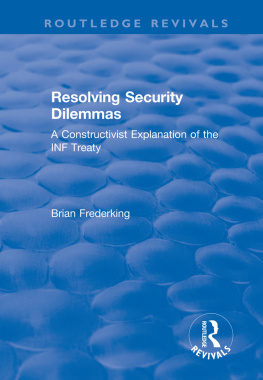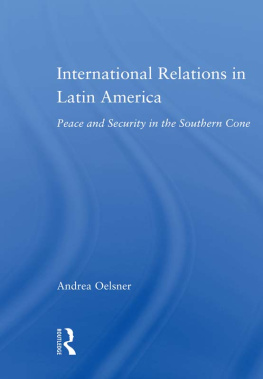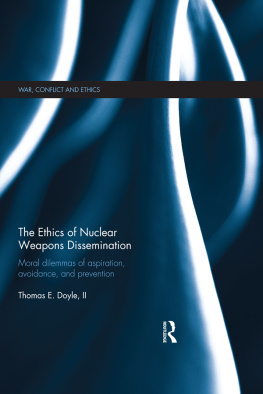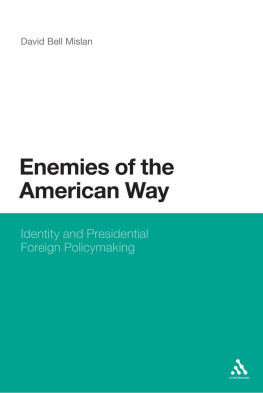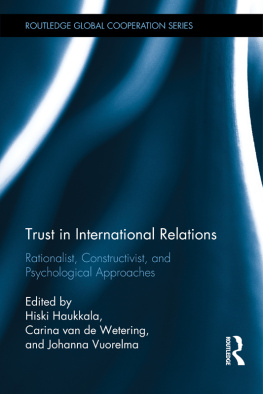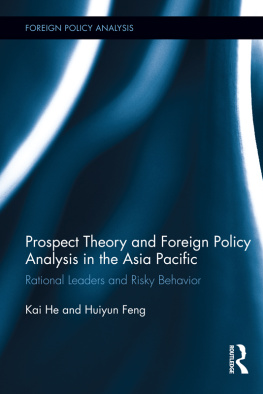RESOLVING SECURITY DILEMMAS
To Debbie
Critical Security Series
Series Editors:
Neil Renwick and Nana Poku
Editorial Board:
Richard Bedford, University of Waikato
Tony Evans, University of Southampton
Mark Miller, University of Delaware
David Newman, Ben Gurion University
Peter Vale, University of Western Cape
Fiona Robinson, Carleton Toronto
Resolving Security Dilemmas
A constructivist explanation of the INF Treaty
Brian Frederking
McKendree College, USA
First published 2000 by Ashgate Publishing
Reissued 2018 by Routledge
2 Park Square, Milton Park, Abingdon, Oxon OX14 4RN
711 Third Avenue, New York, NY 10017, USA
Routledge is an imprint of the Taylor and Francis Group, an informa business
Copyright Brian Frederking 2000
All rights reserved. No part of this book may be reprinted or reproduced or utilised in any form or by any electronic, mechanical, or other means, now known or hereafter invented, including photocopying and recording, or in any information storage or retrieval system, without permission in writing from the publishers.
Notice:
Product or corporate names may be trademarks or registered trademarks, and are used only for identification and explanation without intent to infringe.
Publisher's Note
The publisher has gone to great lengths to ensure the quality of this reprint but points out that some imperfections in the original copies may be apparent.
Disclaimer
The publisher has made every effort to trace copyright holders and welcomes correspondence from those they have been unable to contact.
A Library of Congress record exists under LC control number: 99075554
ISBN 13: 978-1-138-63413-8 (hbk)
ISBN 13: 978-1-315-21129-9 (ebk)
While I am responsible for any errors or inadequacies, I am grateful to so many people who contributed to this book. Gavan Duffy has greatly influenced the substantive and methodological aspirations of this book. Gavan introduced me to the notion that one could model social interaction with concepts from linguistics. His efforts to develop early iterations of the model presented here provided an invaluable foundation for this book. His mentoring and friendship will influence any future success I achieve as a scholar.
L.H.M. Ling, Naeem Inayatullah, Fred Frohock, and Jim Bennett provided valuable comments on early versions of this book. Seth Tucker, Joe Montecalvo, Mark O'Gorman, Angelo Rivera, Anna Agathengelou, Jonathan Bach, Neal Carter, Volker Franke, Terrence Guay, and Christopher Jones also provided friendship, support, and encouragement. I would like to thank those gathered at the 1994 Junior Master's Class at the University of Dlinois, including Dina Zinnes, Bob Boynton, Thad Brown and Richard Muncaster, Bear Braumoeller, Erik Gartzke, Michael Fisherkeller, Sara McLaughlin, Lisa DeLorenzo, and Atsushi Ashida.
My new colleagues and students at McKendree College have also been tremendously supportive. While they are too numerous to mention, I particularly want to thank David Ahola for his unbounded confidence in my abilities. As a teacher, a mentor, a friend, and now a colleague, David has had a great influence on my life. I am grateful to Brenda Boudreau for editing portions of this book. And I also want to thank everyone at Ashgate who helped make this book a reality.
Edited portions of 'Language Games: Dialogical Analysis of the INF Negotiations,' co-written with Gavan Duffy and Seth Tucker in the June 1998 issue of ISQ appear in .
Finally, I want to thank my wife Debbie. She postponed her dreams so that I could pursue mine. I will spend the rest of my life returning the favor.
This book adds to the growing constructivist literature emphasizing the importance of cultural beliefs, social norms and socialized identities in the study of world politics. Like many other constructivists, I entered the discipline when the end of the cold war and the 'third debate' were challenging mainstream international relations theories. The end of the cold war challenged the neorealist emphasis on the material distribution of capabilities and constant Hobbesian conflict. The 'third debate' challenged the hegemony of positivist social science methods and rationalist assumptions about social interaction. This book emerges from those intellectual and political currents: I develop an interpretive approach to social interaction and argue that a constructivist explanation of the Intermediate Range Nuclear Forces (INF) Treaty, and by extension the end of the cold war, is more coherent than a neorealist explanation.
Two concepts anchoring this book are 'security dilemmas' and 'security communities.' Security dilemmas exist when states attempt to increase their security, but those actions decrease the security of others, who respond in kind, and the spiral continues. Security dilemmas occur in environments of mistrust and suspicion. Security communities are groups of states who maintain dependable expectations of peaceful change. Security communities occur in environments of mutual trust. Neorealists assume that security dilemmas are inherent material realities of world politics and that striving to develop security communities is Utopian and counterproductive to the establishment of order. States should acquire military capability and maintain order through a balance of power.
Constructivists, however, argue that both security dilemmas and security communities are possible sets of intersubjective rules governing state interaction. While security dilemmas may be more common, there is nothing inherent to world politics that precludes security communities. Constructivists study how, under certain conditions, transnational forces and state interactions generate the trust, reciprocity, shared knowledge, and identities necessary to transform global politics and develop security communities. Rationalist approaches to international relations like neorealism do not allow for the transformational possibilities of interstate interaction.
For example, the only way to explain the INF Treaty and the end of the cold war within the realist language of power is some form of the buildup argument: that the Soviet Union succumbed to the material, technological, and economic superiority of the US. Security dilemmas cannot be politically resolved, but only won or lost. However, within the constructivist language of beliefs, norms, and identities, one can explain the INF Treaty and the end of the cold war with the new thinking argument: that the superpowers reconceptualized their security requirements and altered the social rules of the cold war. Generating shared knowledge, norms, and identities can help resolve security dilemmas and begin the construction of security communities.
In this book I focus on interstate interaction and the generation of shared knowledge, norms, and identities - or new thinking - necessary for the superpowers to agree to the INF Treaty. The INF Treaty itself did not resolve the cold war security dilemma or construct a security community between the superpowers. But it was an important first step in the process that eventually ended the cold war. As I will show, when the superpowers acted in a way consistent with the security dilemma rules of the cold war, they could not logically sign an effective INF Treaty. Only after the superpowers challenged the security dilemma rules of the cold war - and acted in a way more consistent with security community rules - could they sign an effective INF Treaty.

